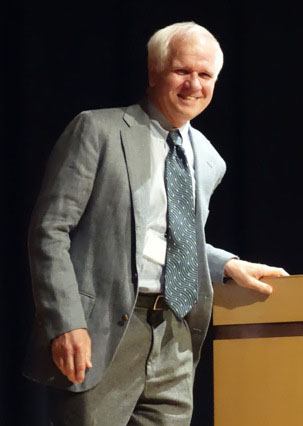
PROVIDENCE, R.I. [Brown University] — Two Brown University scientists, chemist Paul Williard and neuroscientist Jerome Sanes, have won Fulbright Scholar Awards to embark upon research projects with colleagues in France next year.
Sanes, professor of neuroscience and director of Brown’s MRI facility, intends to travel to Paris to collaborate with scientists at the Brain and Spinal Cord Institute, an affiliate of the University of Pierre and Marie Curie, Paris, on a study of cognitive flexibility in healthy adults and those with Parkinson’s disease. Using functional magnetic resonance imaging, Sanes said he hopes to measure the activation in the brain that people employ when adaptively changing their actions as warranted by the task conditions or their own volition. He and his French collaborators will see how that activation, occurring in distinct but connected brain regions, may differ in people with Parkinson’s, who sometimes exhibit less cognitive flexibility. That could lead to future development of therapeutic interventions, either with implanted neurotechnologies or medicines.

Participants in the research will use a joystick to maneuver through a virtual scene. Sometimes they will experience external cues that mandate changes in movement direction, and other times they will have opportunities to freely change their minds about whether to modify movement direction. The tasks are somewhat akin to the kinds of cognitive flexibility evoked in the real world by tasks such as driving. In each case, Sanes will assess the brain activation occurring during those mental adaptations, employing sophisticated techniques developed with Xi Luo, assistant professor of biostatistics, to track the connectivity of participating brain regions, such as the basal ganglia.
Williard, professor of chemistry, plans to join with colleagues at the University of Rouen to work on developing a novel method for discerning physical properties of molecules in solution using nuclear magnetic resonance. Success would mean having a simple, rapid new means for determining important measures such as a molecule’s size and weight, and certain chemical states. Ultimately the work could help scientists study the interactions drug molecules have with proteins in solution.
“It’s not the molecules themselves that are important, it’s the methodology,” Williard said.
Williard and Sanes included, 17 Brown faculty members have been named Fulbright scholars over the last six academic years. The program, established in 1946 by U.S. Sen. J. William Fulbright, sponsors U.S. and foreign participants for exchanges in a wide range of disciplines “to increase mutual understanding between the people of the United States and the people of other countries.”

